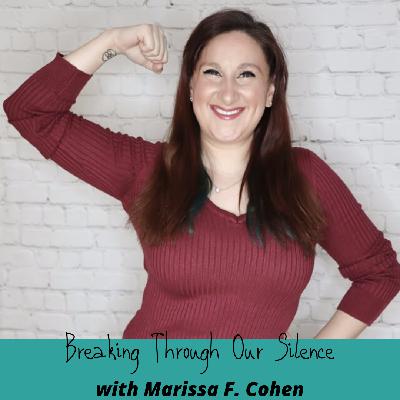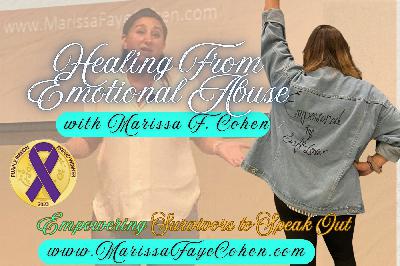Healing From Emotional Abuse: Movies About Narcissism : With Mike Sellari (Part 1)
Description
Can you heal from abuse? What do I do after leaving my narcissist? What does a healthy relationship look like? These concerns cross the minds of over 20 people every minute; over 28,800 people every day. And the sad fact is, we still don’t talk about it enough. Healing from Emotional Abuse isn’t a bandaid situation. But it doesn’t have to be a five year process either. Millions of other survivors around the worlds entire lives have been impacted by their narcissist. Yours doesn’t have to. To show you how to live a free, confident and peaceful life, your host and Founder of the Healing From Emotional Abuse Philosophy, Marissa F. Cohen.
Marissa: Hey Everyone! Thank you so much for joining us this week on Healing From Emotional Abuse. Today I’m so grateful and excited to introduce my friend Mike Sellari to talk about sexual assault and domestic violence and how it’s portrayed in movies and tv. Mike has an amazing background with film. Right now, he lives in LA as a talent agent, but I do have to say that back in 2006, I starred in his first student film that he wrote, produced and directed, called Man Seeking Woman. So we go back a long. time. He’s an awesome person with a great personality and I’m so excited to have him here. So, let’s get started.
So, lets’s talk about some movies. You’re a huge movie buff, you love talking about movies and I love looking at your posts on Facebook. Every single time you watch a movie, you kind of critique it and every season, I love looking at your lists of best movies of the year. So, I’d love your perspective on movies with domestic violence and sexual assault themes, and what you think about them.
Mike:
Okay, I mean, right at the top, I feel like I’m already going to be treading into dangerous waters with whatever I talk about. Mainly because it’s a complicated issue. There’s a lot of different ways we can discuss this. There’s a lot of different points of view, and I think everyone thinks different.
So, I guess it’s hard to talk about, because you’re saying domestic violence, abuse and stuff like that. And a lot of that also goes back into misogyny and a lot of that goes back into the distribution of power between men and women. Especially from pre-60s, because there was that whole “housewife” ideal of the 50s and stuff. And you can see that with older movies with women, “Being in their place.” And men as the aggressor. Even in the 30s there were still powerful women. You look at stuff like the Philadelphia Story or His Girl Friday, or Lady Eve. You’ll see strong women characters besting the man. But you also see people looking at women in a way that was more, “Of the time.” And I guess right at the top, we really can’t look at things from the past with 2020 eyes. We’re going to look back at a lot of stuff, because probably every single one of these movies has happened in the past. And some just come from different generations. And I’m going to talk about movies that I also love, and will watch still. It’s kind of like you have to just be able to say, look, that was a different time. 50 years down the road, we’re going to look at the stuff we’re doing on a normal basis and our kids are going to be like, “What? What are you doing? How could you just let that happen?” And we’re going to say it was just a different time, and they’re going to tell us that’s a bullshit answer. And we’re going to say, look, I know, we just didn’t realize it.
I mean, if you look 5 years ago, the stuff that we were laughing at in comedies that now we’re looking at and we’re pulling on our collars and going yikes because it’s hard to watch.
Marissa:
Superbad is a great example of that, actually.
Mike:
And honestly, a fantastic movie. And something that we’re going to get into is the idea of what is art, and how far can we push our art? And what’s subversive vs. expletive vs. gratuitous. And then, also, if we’re going to show reality, shouldn’t we have to show the dark sides of reality? Because if we hide it, then what are we saying about our history, and stuff like that? For instance, talking about the civil war and the stuff that did or didn’t happen. Talking about our history and movies about slavery. Haven’t we said all we’ve needed to say, or are we hiding stuff from our past that we don’t want to talk about? But we’ve got to keep it.
Something to just start off the top, and this is definitely an abusive thing. Let’s talk about Michael Jackson for a second. Obviously, we’ve known about his quirks and his weird things, and I truly believe he had a mental illness - and I believe a lot of this stems from mental illness. There’s a whole thing we can talk about with Michael Jackson and his family. And also just what were people doing in just letting their kids be around him? And also stuff we just decided to turn a blind eye to because of certain things. And it keeps going, then Leaving Neverland comes out and that was an intense documentary. And after that came out, James L. Brooks announced that they were puling an episode from the Simpsons from all internet, rerun, syndication, and now it’s on Disney+ but that episode is not on Disney+. And it’s not even that Michael is in it. You’re not seeing his imagery. It has nothing to do with off-color thing. The premise of the episode is Homer goes to a mental institution and meets an inpatient who calls himself Michael Jackson. He’s clearly not Michael Jackson, but he’s voiced by Michael Jackson. It’s weird that we pull that form our history, because we have to look back and see that we see that. However, James L. Brooks says, “This is my stuff. I get to make the decision over what I want out there. And I don’t want it to seem like Michael Jackson is getting more residuals, or his estate getting money from this.” So, when we start taking things out of our history and out of our films, I worry that we have the ability to repeat ourselves in dangerous ways. It’s important to see that stuff. It’s important to acknowledge that we were off base and learned from it. We can watch those movies in a different way. We can see that they were made in those times.
For instance, let’s go into now talking about this. There was a time when rape was a joke. It was kind of funny. It was played off as not a big deal. It was played off in comedies in particular as something that could just happen. Let’s talk about specifics here. There’s a movie if you think back into the early 2000s, there’s a movie I really like that a lot of people don’t called 40 Days and 40 Nights. It starts Josh Hartnett and Shannyn Sossamon, who I just love. And the premise of the movie is, this guy is experiencing a breakup. He’s experiencing this obsession with sex and stuff. So he decides to not masturbate or have sex or do anything sexual for Lent. For 40 Days and 40 Nights. And everyone says he can’t do it. It’s impossible. And he starts losing his mind… it’s a comedy. Meanwhile, his friends are all betting on the day that he’s going to “bust”. And people try to take advantage of that. At the end of the movie, his ex girlfriend bets a lot of money on the final day, and then rapes him while he’s asleep. It’s seen as just a plot point. And then the other girl, the girl who likes him, is like, “I can’t believe you had sex with her.” It’s not, she did it against his will. He was pinned down. He didn’t want it. But that doesn’t matter in the context of that story. But if we look at it there, it’s really weird that she just rapes him and we’re not going to talk about that? And the same thing happens in Get Him to the Greek. Jonah Hill is raped by Carla Gallo. You mentioned Superbad, with the period blood girl. That’s like the reversal of that scene in a way.
So there’s this playfulness. There’s this moment in Revenge of the Nerds where Louis puts on this Darth Vader costume that the jock was wearing. And the hot girl, thinking it’s the jock has sex with him. And he pulls off the mask and she’s like, “You’re that nerd!” But she’s like, that was wonderful. And she forgets it. Like he’s “sexed her” into it’s okay.
If we at that and we look back into the 80s the 70s, moments in the 60s, and even in the 90s and 2000s, and late 2010s. We see these moments. It was before being really aware of what we were doing.
There’s a philosophy I have and that’s: What we put on TV really feeds into society. And then society feeds it back. It’s a cycle. You see movies and I can’t think of any specifics, but the guy pursues the girl. She says no. And the idea is, it’s romantic to keep going and push, push, push. Keep doing that. You see it in tons of high school movies. You see it in movies like American Pie. You see it in to an extent, When Harry Met Sally. That teaches us at a young age that “A No just means you have to keep going, and push past the no. And one day, she’ll give you a shot.” And so that feeds back into it. And that becomes problematic.
However, we’ve also romanticized a certain thing. There’s a term from How I Met Your Mother which I love and use in my own daily life. It’s called Dobbler-Dahmer effect. It means an act could be construed a









